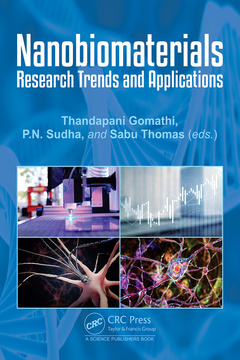Nanobiomaterials Research Trends and Applications
Coordonnateurs : Gomathi Thandapani, Sudha P.N., Thomas Sabu

Nanobiomaterials: Research Trends and Applications ? Biomaterials are derived from natural resources such as plants, animals and marine sources. These biomaterials have advanced applications, across a range of key industries due to their low cost, being easy to process, being biocompatible and so on. The modification of biomaterials in the nanoform enhances their applications.
The book begins with an overview of nanobiomaterials, processing, classifications, fabrication and sustainability. In-depth chapters in Part I address the most recent methods and techniques for physicochemical characterisation, processing of blends and composites based on nanomaterials, and separation. Chapters in Part II focus on the biological and biomedical applications specifically in antimicrobial chemotherapy, drug delivery, tissue engineering, cancer therapeutics, robust biosolar cells, and 3D printing. The chapters in Part III mostly focus on environmental applications, including wastewater treatment, water desalination, bioremediation, and agricultural uses. The book is extremely useful for scientists, R&D specialists, designers, and engineers across sectors and disciplines who are interested in using biopolymers for parts and products.
PREPARATION, CLASSIFICATION AND PHYSICO-CHEMICAL PROPERTIES. Nanobiomaterials: An Overview. Principles and Applications of Nanobiotechnology. Nanobiomaterials: A Scientometric Review of the Research. Electrospinning—Material, Techniques and Biomedical Applications.Toxicity Towards Nanostructured Biomaterials in Human Health. Fabrication of Micro and Nano Devices for Tissue Engineering Applications. Characterization of Nanostructures. BIOLOGICAL AND BIOMEDICAL APPLICATIONS. Bioabsorbable Engineered Nanomaterials for Antimicrobial Chemotherapy. Hybrid Polymeric Nanobiomaterials for Applications in Drug Delivery Systems and Tissue Engineering. Therapeutic Applications of Nanomaterials. Chitosan Based Nanobioceramics in Bone Tissue Engineering Application. Nanobiomaterials in Cancer Therapeutics. Nanoporous Silicon Materials for Bioapplications by Electrochemical Approach. Bionanotechnology in Robust Biosolar Cells. Nanobiomaterials in Tissue Engineering Applications. Nanobiomaterials in the Fight against Mosquito Borne Diseases. Nanobiotechnology and Chemotherapy. ENVIRONMENTAL APPLICATIONS. Industrial Wastewater Sources and Treatment Strategies by using Bionanomaterials. Applications of Metallic Nanomaterials for the Desalination of Water: Perspectives and Limitations. Nanobiomaterials in Bioremediation. Bio-Nanotechnology in Agriculture: New Opportunities and Future Prospects.
Dr. Thandapani Gomathi, Ph.D., is presently working as an Assistant Professor in the Department of Chemistry, at DKM College for Women (Autonomous), Affiliated to Thiruvalluvar University, Vellore, Tamilnadu, India. She received her M.Sc., M.Phil., and Ph.D. degrees in Chemistry from Thiruvalluvar University in 2006, 2008 and 2015. She was awarded the University Ninth rank in M.Sc. Chemistry from Thiruvalluvar University, Vellore (2006). Her major research interests are in the field of drug designing and drug delivery, nanotechnology, polymer chemistry, environmental chemistry, biopolymers for biomedical applications. She is highly enthusiastic about pursuing research and developmental activities and research is her passion. Furthermore, she expended her research fields up to the development of nano drug delivery system. To date, she has authored around 105 research papers and 15 book chapters.
Dr. P.N. Sudha is presently working as a Principal at DKM College for Women (Autonomous), affiliated to Thiruvalluvar University, Vellore, Tamilnadu, India. She obtained her Doctoral degree in Chemistry–Biology Interdisciplinary Science from Madras University. She is a fellow of International Congress of Chemistry and Environment, and National Environmentalists Association. Her name was included in Marquis Who’s Who in the World (2011). She has been listed in the worlds top 2% scientists consecutively for the past three years. Her research interests are polymer chemistry, environmental chemistry, bioremediation, and photochemistry. She has authored 11 books and 13 book chapters. She is a life member of Asian Chitin Chitosan Society. She is a co editor and reviewer of international journals. Her immense experience in research is the key asset for the development of research among the young women researchers in rural areas. She expanded her research fields up to the use to biomaterials such as chitin and chitosan for biomedical application. Sh
Date de parution : 10-2023
17.8x25.4 cm
Thèmes de Nanobiomaterials :
Mots-clés :
Functional nanomaterials; Micro/nanoelectronics; Self-cleaning; Nanosafe Textiles; New technologies; Tissue Engineering; Bone Tissue Engineering; Drug Release; Chitosan Nanoparticles; Nanoparticles Synthesized; Dye Sensitized Solar Cells; Ag NPs; Bag; Quantum Dot; Cellulose Nanofibers; Silver Nanoparticles; Porous Silicon; PCL; Synthesized Silver Nanoparticle; HRTEM; CS NPs; Bone Tissue; Annona Muricata; DDS; Data Set; Pupicidal Activity; Larvicidal Activity; Electrospinning; Electrospun Nanofibers; Population Papers



